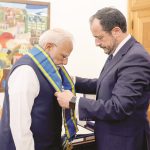Social systems are the binding forces that act as the anchors for the tangible and intangible heritage and as such they enrich it and sustain it. It has to be borne in mind that the conceptual definition of heritage is based on inheritance and this basic structure makes it continuous. It is not only the inheritance of the past but the inheritance of the present for the heritage in making in case of the future. If tangible heritage has evolved from the cultural core and found expression in cultural landscape on the landforms then intangible heritage is the transfer of traditions and rituals besides art forms from generation to generation. Tourism has an immense impact on the essence and basic nature of heritage. Adaptability of heritage for the sake of marketing may be the necessity but it has to be seen that it does not violate the message of culture in the heritage and keeps intact its aura. Heritage is the identity of the social group or community by other means. If this sense of identity is violated, it renders the heritage ineffective to retain the faith of the niche segment. Various studies have brought to the fore the degradation and vandalisation of the tangible heritage by the irresponsible influx and behavior of the tourists. The lack of heritage sensitization of the tourists results in numerous threats to the heritage asset in terms of the carrying capacity. When a tourist who views even the heritage tourism destination a the place of recreation and indulges in disfiguring the walls of the monument then the tourist is posing a threat. The basic aim of heritage tourism is violated that advocates for the sustainable development of the asset by tourist activity. Tourism’s impact on intangible heritage can be judged from changes brought about in its transmission process. Social dependence of the intangible heritage has an impact on the families that are connected with the handicrafts and other forms of intangible heritage. Incentive that is associated with the craftsmanship of this heritage develops a different paradigm .The control of the economic muscle of tourism on the intangible heritage enhances its transmission but it the real element of identity, status and recognition are sidelined. It is the main reason that while marketing the intangible neglect of these elements cause the rupture of the desired long term strategies. It can be argued that the artisans learn the craft from their parents without being fully aware of the economic incentives. Negative role played by tourism in terms of heritage and especially the intangible heritage lies in the argument that it often declares arts and crafts as ‘ careers’ or the sources of livelihood that are available for the consumption of the visitors. It is the major area of disagreement between the tourism industry and the heritage professionals and rightly so. This approach hampers the strengthening of the social foundation where it has its roots of transmission. There are examples that arts and crafts have sustained in the atmosphere of cooperation among the members of the social groups and not by competition. Example of Laotian woven textiles is based on this principle of cooperation and it has strengthened the social context of the intangible heritage and saved it from commoditization .Marketing strategies that co-opt this principle have proved to be the effective tools to social, political and economic harmony through heritage tourism.
Search
Archives
- August 2025
- July 2025
- June 2025
- May 2025
- April 2025
- March 2025
- February 2025
- January 2025
- December 2024
- November 2024
- October 2024
- September 2024
- August 2024
- July 2024
- June 2024
- May 2024
- April 2024
- March 2024
- February 2024
- January 2024
- December 2023
- November 2023
- October 2023
- September 2023
- August 2023
- July 2023
- June 2023
- May 2023
- April 2023
- March 2023
- February 2023
- January 2023
- December 2022
- November 2022
- October 2022
- September 2022
- August 2022
- July 2022
- June 2022
- May 2022
© 2022 Foxiz News Network. Ruby Design Company. All Rights Reserved.










